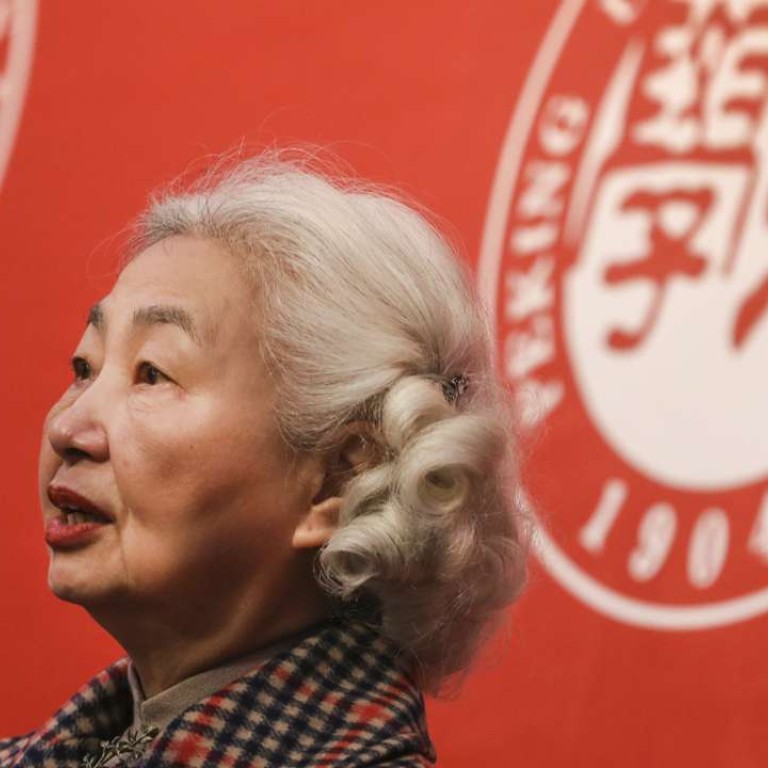
Four candidates for Hong Kong chief executive race ‘too many’, Elsie Leung says
Basic Law Committee vice-chairwoman says she has a deeper working relationship with Carrie Lam than John Tsang
One candidate’s aide and a pan-democratic leader both quickly rejected Elsie Leung Oi-sie’s view.
“I am afraid that there are too many candidates,” Leung, Basic Law Committee vice-chairwoman, said yesterday on the sidelines of a ceremony to celebrate the founding of Peking University’s law school alumni association in Hong Kong.
“This will make the chance to win more than half [of votes] more difficult. It’s impossible to have four candidates.”
“I hope the candidates will make some adjustments and calculate their chances of winning before joining the election,” Leung added.
She cited the law and said that if no one got more than half of the votes there would be a run-off – a second round of voting, choosing between the two candidates with the most votes from the first round.
If neither candidate wins more than 600 votes in a second round, she said, the election would be aborted.
Nominations open on February 14.
Lam is seen by many as Beijing’s preferred choice.
Leung, a former justice secretary, said among the candidates she had a deeper working relationship with Lam, praising her as someone “who works with her heart” and is “willing to listen”, while she said she did not know much about Tsang other than his being “familiar with government operations”.
She said she could not support any candidate because she is not on the Election Committee. She also said that it was “not unusual” that Beijing had taken more than a month to process Tsang’s resignation, a delay seen by some as a signal of discouragement.
In response to Leung’s comments about the crowded field, Woo said he would not comment on “different views of people in society” and that he would continue to build up support and act according to the Basic Law.
And legislator Michael Tien Puk-sun, who supported his New People’s Party chairwoman Ip, disagreed with Leung, saying a competitive election in which all candidates get a good amount of votes would be a good thing.
“If a candidate can win as many as 700 votes [from a field of four] in the first round, it’ll only be Beijing manipulating the election committee and there’s no competition,” Tien said. He said he did not think a second round, which he would welcome, was likely to end in an abandonment.
“This is to assume the pan-democrats will give up their votes so neither candidate can win 600 votes. But this assumption does not stand,” he said. The pan-democrats hold more than 300 votes.
Tien noted that some said the next leader should win more than 689 votes, the number for unpopular incumbent Leung Chun-ying. But, he said: “If the two candidates in the second round end up with 610-590, it’ll still be a glorious victory.”
Civic Party chairman Alan Leong Kah-kit said Elsie Leung, as a former justice secretary, should be aware that one should not violate the law and discourage people from standing in elections.
A source with knowledge with Lam’s campaign estimated that she and Tsang would each secure about 400 “cast-iron” votes, and that there were 300 or so floating voters, not entirely loyal to Beijing. The chief executive elections in 1996 and 2012 both had three candidates. The 2007 poll had just two, while the ones in 2002 and 2005 were uncontested.
Yesterday Lam visited an entrepreneurship network and did what Tsang also likes to do – taking selfies with young people there. She had the photos posted to the Facebook page of second-generation tycoon Lau Ming-wai, who went with her. Lau, chairman of Chinese Estates Holdings, said he was “a friend and a supporter” of Lam’s but would not say whether he was officially on her election team.
Additional reporting by Stuart Lau

